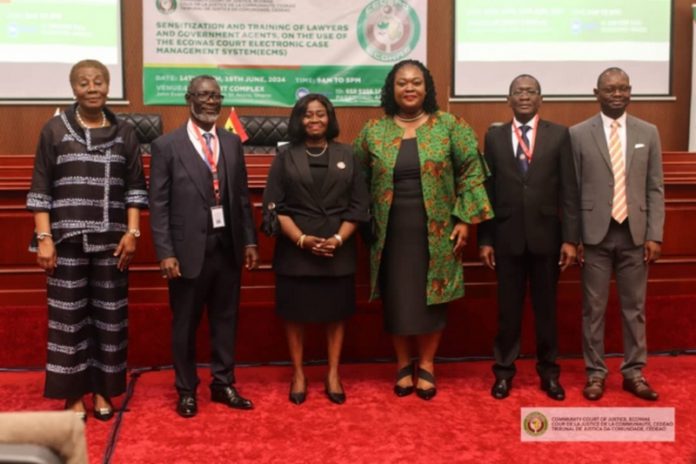The Chief Justice, Her Ladyship Justice Gertrude Torkornoo has underscored the need for countries in West Africa to use technology to collaborate, uphold and enforce fundamental human rights.
She pointed out that countries in the sub-region can leverage technology to work together in justice delivery for the good of people.
Speaking at Sensitisation and Training on Electronic Case Management System workshop in Accra organized by the ECOWAS Court of Justice, Mrs. Torkornoo said technology will provide the opportunity to cut delays in justice delivery.
She stated that West African countries can reduce the long procedures and time wasted in justice delivery by making use of simple electronic devices.
“The narrative of the impact technology of justice delivery has been positively well documented. Technology is affording us a justice delivery an opportunity to cut cost, to be more efficient and to avoid unnecessary delay in the administration of justice”.
According to her, the outbreak of the COVID-19 pandemic, demonstrated that geographical locations of courts would no longer be a barrier in the delivery of justice.
Mr. Torkornoo applauded the ECOWAS court, for championing electronic justice among member countries of ECOWAS.
“I am especially glad that efforts are being made by the ECOWAS Court not just open its door for access to justice on supra national level but to perform the retail act, that would provoke and mobilise appropriate use of the regional court for justice delivery”, she said.
The week-long sensitisation and training programme for lawyers will be on the ECOWAS Court of Justice, newly implemented Electronic Case Management System (ECMS).
This event, taking place in Accra from 14 – 19 June 2024, aims to equip legal practitioners with the necessary skills to navigate the Court’s innovative digital platform.
In his opening remarks, Hon. Justice Edward Amoako Asante, President of the ECOWAS Court of Justice, expressed gratitude to the Almighty and extended warm greetings from Abuja, Nigeria, the seat of the Court.

He acknowledged the hospitality of the Government and people of Ghana, specifically thanked Her Ladyship the Chief Justice of the Republic of Ghana and the Attorney General and Minister of Justice.
Justice Asante highlighted the historical context of the ECOWAS Court of Justice, established under the Lagos Treaty of 1975 and operational since 2001.
He emphasised the Court’s expanded jurisdiction to include human rights cases since 2005, underscoring its crucial role in upholding fundamental human rights, the rule of law, and good governance within the ECOWAS region.
The President outlined the Court’s efforts to enhance access to justice through digitalisation, accelerated by the COVID-19 pandemic saying that the adoption of the 2020 Practice Directions on Electronic Case Management and Virtual Court Sessions marked a significant shift towards technological solutions.
These innovations have now become permanent features, including online filing of legal documents, electronic service of documents, and virtual court sessions via platforms such as Zoom and Microsoft Teams, the president explained.

Justice Asante said that the introduction of the ECMS represents a further commitment to modernising judicial processes, aiming for greater efficiency and accessibility, adding that the system supports electronic filing, automatic electronic service, and comprehensive electronic management of cases.
“With 24/7 access through a user-friendly portal available in English, French, and Portuguese, the ECMS facilitates real-time case information, court notifications, and hearing schedules, enhancing transparency and reducing costs,” he emphasised.
This sensitisation and training program in Accra is the second of three planned events, following a successful session in Lomé, Togo, and preceding an upcoming session in Praia, Cabo Verde. Conducted in a hybrid format, these events ensure broad participation from lawyers across ECOWAS member states, both in person and online.
Justice Asante thanked the Chief Justice of Ghana for providing the facilities at the Law Court Complex and encouraged all participants to fully engage with the training to harness the benefits of the ECMS. He reiterated the Court’s dedication to building a more accessible and effective justice system for the community.

